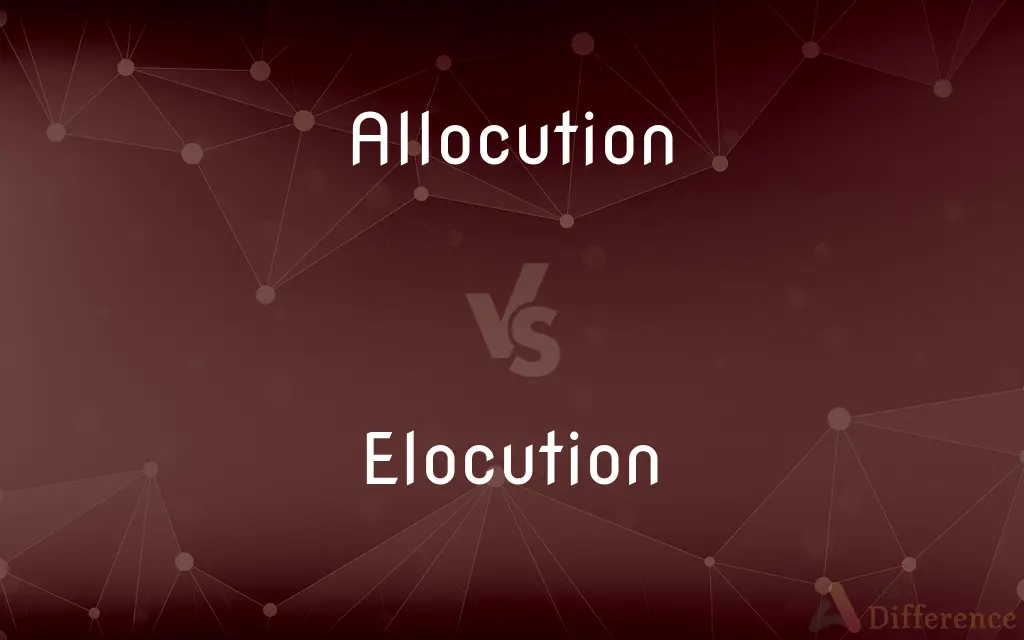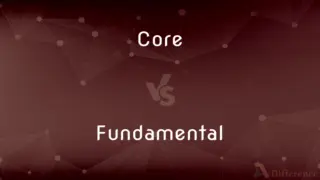Allocution vs. Elocution — What's the Difference?
Edited by Tayyaba Rehman — By Urooj Arif — Updated on April 3, 2024
Allocution emphasizes the formal speech given by a defendant after conviction, focusing on remorse or explanation, whereas elocution concerns the art of clear and expressive speech, emphasizing diction and delivery.

Difference Between Allocution and Elocution
Table of Contents
ADVERTISEMENT
Key Differences
Allocution is a legal term referring to a formal statement made by a defendant in court, typically after conviction but before sentencing. It allows the defendant to plead for leniency, express remorse, or provide an explanation. On the other hand, elocution is rooted in the field of rhetoric and public speaking, focusing on the manner of speech delivery, including tone, pace, volume, and articulation.
While allocution has a specific role within the judicial process, offering a last opportunity for defendants to influence sentencing, elocution is a broader discipline that can be applied in various contexts, from formal presentations to everyday conversations. Whereas allocution is a moment for personal address, elocution emphasizes the technical aspects of speaking well.
In the context of purpose, allocution is typically aimed at affecting the outcome of a sentencing decision, with the defendant seeking to mitigate punishment. Elocution, on the other hand, aims to improve the speaker's overall communication skills, enhancing their ability to convey messages effectively and persuasively in any situation.
The audience differs significantly between the two; allocution is directed at a judge or sentencing authority within a courtroom, making it a highly specific and formalized address. Elocution, however, has a much broader audience, ranging from a small group in a meeting to a large audience at a public event, focusing on engaging and impacting listeners through skillful speech.
The impact of allocution can be immediate and profound, potentially affecting the legal consequences faced by a defendant. In contrast, the benefits of elocution are often long-term, contributing to personal and professional development by improving public speaking and presentation skills, enhancing one’s ability to influence, persuade, and inform others.
ADVERTISEMENT
Comparison Chart
Definition
Formal statement by a defendant after conviction
Art of clear and expressive speech
Purpose
To plead for leniency or express remorse
To improve speech delivery and communication
Context
Judicial, within a courtroom
Various, including public speaking and daily communication
Audience
Judge or sentencing authority
Broad, from small groups to large audiences
Impact
Can influence sentencing outcomes
Enhances personal and professional communication skills
Compare with Definitions
Allocution
Judicial procedure step.
Allocution is a critical phase between conviction and sentencing in criminal proceedings.
Elocution
Practice of vocal expression.
Elocution involves mastering the tone,volume, and speed of speech.
Allocution
A formal speech by a defendant in court.
The judge allowed the defendant an opportunity for allocution before passing the sentence.
Elocution
Focus on expressive speech delivery.
Elocution emphasizes clarity, emotion. and pacing in speech.
Allocution
Defendant's last statement before sentencing.
The allocution moved the courtroom, illustrating the defendant's remorse.
Elocution
Skill of communicating with confidence.
Through elocution, he learned to speak in front of large audiences without anxiety.
Allocution
Opportunity to address the court after conviction.
During allocution, the defendant apologized to the victim's family.
Elocution
The art of effective public speaking.
She took elocution lessons to improve her presentation skills.
Allocution
A plea for leniency to the judge.
The defendant’s allocution emphasized rehabilitation over punishment.
Elocution
Training in diction and pronunciation.
Elocution classes helped him overcome his fear of public speaking.
Allocution
An allocution, or allocutus, is a formal statement made to the court by the defendant who has been found guilty prior to being sentenced. It is part of the criminal procedure in some jurisdictions using common law.
Elocution
Elocution is the study of formal speaking in pronunciation, grammar, style, and tone as well as the idea and practice of effective speech and its forms. It stems from the idea that while communication is symbolic, sounds are final and compelling.
Allocution
A formal and authoritative speech; an address.
Elocution
The skill of clear and expressive speech, especially of distinct pronunciation and articulation
Lessons in singing and elocution
Allocution
(Law) A statement that is made by a defendant before a sentence is pronounced.
Elocution
The art of public speaking in which gesture, vocal production, and delivery are emphasized.
Allocution
A formal speech, especially one which is regarded as authoritative and forceful.
Elocution
A style or manner of speaking, especially in public.
Allocution
The question put to a convicted defendant by a judge after the rendering of the verdict in a trial, in which the defendant is asked whether he or she wishes to make a statement to the court before sentencing; the statement made by a defendant in response to such a question; the legal right of a defendant to make such a statement.
Elocution
The art of public speaking with expert control of gesture and voice, etc.
Allocution
The legal right of a victim, in some jurisdictions, to make a statement to a court prior to sentencing of a defendant convicted of a crime causing injury to that victim; the actual statement made to a court by a victim.
Elocution
Utterance by speech.
[Fruit] whose taste . . . Gave elocution to the mute, and taughtThe tongue not made for speech to speak thy praise.
Allocution
(Roman Catholicism) A pronouncement by a pope to an assembly of church officials concerning a matter of church policy.
Elocution
Oratorical or expressive delivery, including the graces of intonation, gesture, etc.; style or manner of speaking or reading in public; as, clear, impressive elocution.
Allocution
The mode of information dissemination in which media broadcasts are transmitted to multiple receivers with no or very limited capability of a two-way exchange of information.
Elocution
Suitable and impressive writing or style; eloquent diction.
To express these thoughts with elocution.
Allocution
The act or manner of speaking to, or of addressing in words.
Elocution
An expert manner of speaking involving control of voice and gesture
Allocution
An address; a hortatory or authoritative address as of a pope to his clergy.
Allocution
(rhetoric) a formal or authoritative address that advises or exhorts
Common Curiosities
How does allocution differ from elocution?
Allocution is a specific legal term related to court proceedings and sentencing, while elocution refers to the general skill of clear and expressive speech delivery.
What is allocution?
Allocution refers to a formal statement made by a defendant in court after being convicted but before sentencing, often to express remorse or seek leniency.
Can elocution techniques benefit someone making an allocution?
Yes, mastering elocution can enhance the effectiveness of an allocution by improving clarity, emotional impact, and persuasiveness.
What is elocution?
Elocution is the art of speaking in a clear, expressive, and effective manner, focusing on the delivery aspects of speech such as tone, pace, and diction.
Who benefits from elocution training?
Anyone looking to improve their public speaking, communication skills, or confidence in verbal expression can benefit from elocution training.
Can allocution be waived by a defendant?
Yes, in many jurisdictions, a defendant can choose not to make an allocution.
Is allocution mandatory in court proceedings?
Allocution practices vary by jurisdiction, but it is often an opportunity given to defendants rather than a mandatory procedure.
Does allocution affect sentencing?
Yes, a sincere and persuasive allocution can influence a judge's sentencing decision, potentially leading to a more lenient sentence.
What is the main goal of elocution?
The main goal of elocution is to enhance the speaker's ability to convey messages clearly, expressively, and persuasively.
Is there a specific format for allocution?
While there is no universal format for allocution, it typically includes an expression of remorse, explanation of actions, and sometimes a plea for leniency.
Are elocution skills only necessary for public speakers?
While particularly beneficial for public speaking, elocution skills are valuable in any context where clear and effective communication is important.
What topics might be covered in elocution lessons?
Elocution lessons can cover a range of topics, including breath control, pronunciation, tone modulation, and body language.
How can one improve their elocution?
Improving elocution can involve practicing speech exercises, receiving professional coaching, and gaining experience through speaking engagements.
How is allocution practiced in different countries?
The practice and importance of allocution vary globally, reflecting each country’s legal traditions and procedures.
What might a judge consider during an allocution?
A judge might consider the sincerity, remorse, and readiness for rehabilitation of a defendant during an allocution.
Share Your Discovery

Previous Comparison
Emit vs. Immit
Next Comparison
Core vs. FundamentalAuthor Spotlight
Written by
Urooj ArifUrooj is a skilled content writer at Ask Difference, known for her exceptional ability to simplify complex topics into engaging and informative content. With a passion for research and a flair for clear, concise writing, she consistently delivers articles that resonate with our diverse audience.
Edited by
Tayyaba RehmanTayyaba Rehman is a distinguished writer, currently serving as a primary contributor to askdifference.com. As a researcher in semantics and etymology, Tayyaba's passion for the complexity of languages and their distinctions has found a perfect home on the platform. Tayyaba delves into the intricacies of language, distinguishing between commonly confused words and phrases, thereby providing clarity for readers worldwide.














































